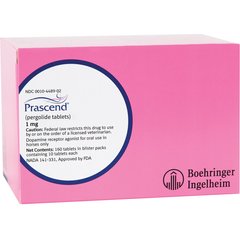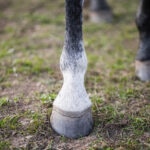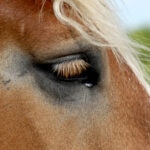Cushing’s Disease in Horses: Causes, Symptoms, and Treatment

Photo by iStock/TamaraLSanchez
Equine Cushing’s disease, also called pituitary pars intermedia dysfunction (PPID), is the most commonly diagnosed endocrine disorder in horses and ponies. Caused by a hormonal imbalance, PPID in horses leads to a variety of health issues that are best managed when diagnosed early.
Find out how to help your affected horse in our guide to the causes, symptoms, and treatments for equine Cushing’s disease.
What Is Cushing’s Disease in Horses?
PPID is a disorder of the pituitary gland that mainly affects middle-aged and older horses,.
Other common names for the condition include:
- Equine Cushing’s disease, a term borrowed from human and canine medicine. It’s important to note that Cushing’s disease in horses is a different condition from Cushing’s disease in dogs and people.
- Equine hyperadrenocorticism, which refers specifically to an excessive production of corticosteroids by the adrenal gland.
- Pituitary adenoma, which describes a benign tumor of the pituitary gland.
If left untreated, Cushing’s disease can have long-term effects on your horse’s health and welfare.
Because it suppresses the immune system, “PPID impairs horses’ ability to heal from various ailments such as musculoskeletal injuries, infections, and disease,” explains Charlotte Weisberg, VMD, associate veterinarian at Mountain Pointe Equine Veterinary Services, in Long Valley, New Jersey.
“PPID may, for example, make a horse more susceptible to disease or prolong their recovery,” she says.
Causes and Risk Factors of Equine Cushing’s Disease
The underlying cause of PPID in horses is the overproduction of the hormone ACTH. Experts agree that age and genetics both appear to play a role.
“PPID mainly affects older horses; however, there are reports of horses as young as 7 years old being diagnosed with Cushing’s,” says Jeremy Frederick, DVM, DACVIM, owner of Advanced Equine of the Hudson Valley, an ambulatory veterinary practice based in Wappingers Falls, New York.
PPID is has not been shown to be heritable, meaning that offspring of horses with PPID are not more likely to develop the disorder.
Science hasn’t found any environmental or sex-related risk factors, either—meaning that mares, geldings, and stallions all over the world are equally affected.
“An estimated 22% of the equine population over the age of 15 years has been found to have PPID,” adds Dr. Weisberg. “This number increases exponentially in older populations, so horse owners should be on the lookout for signs of PPID and expect to test their horses regularly as they age.”
Clinical Signs and Symptoms of Cushing’s Disease in Horses
- Metabolic abnormalities: “We often see PPID in combination with insulin resistance (IR) and hyperinsulinemia (high blood insulin),” says Dr. Frederick. If you want to find out whether your horse has metabolic problems, you can ask your vet to perform a blood test.
- Musculoskeletal abnormalities: Horses with Cushing’s Disease often suffer from weight loss, redistribution of fat, significant muscle wasting, and reduced bone density. This can result in difficulty moving and may lead to injury or lameness.
- Immune system abnormalities: “A much more insidious issue with early onset PPID is immune suppression, making the horse more susceptible to skin and respiratory infections, intestinal parasitism, and poor wound healing,” Dr. Frederick explains.
- Changes in coat: Horses may experience patchy shedding of their coat, or a change in its texture from straight to curly.
- Laminitis: High insulin, which is common in Cushing’s disease, has been linked to the development of laminitis, a painful inflammation of hoof tissue. This can occur in early or late stages of PPID.
Diagnosing Cushing’s Disease in Horses
If you suspect that your horse has developed PPID, you’ll need to make an appointment with your veterinarian. If your equine companion is age 15 years or older, your vet might recommend annual testing, even in the absence of any clinical signs of the disease.
Diagnosing PPID requires a physical exam and a blood test. Elevated levels of adrenocorticotropic hormone (ACTH) can indicate PPID. Your veterinarian may recommend an ACTH panel or a TRH stimulation test.
They may also discuss checking your horse’s insulin, glucose, and lipase to evaluate if they have concurrent metabolic syndrome.
Veterinarians might also use a dexamethasone (corticosteroid) suppression test to determine how well your horse’s adrenal glands are working. However, because administering steroids can cause founder, this test is not utilized as frequently as it once was, especially for horses who have a history of laminitis or are considered at-risk.
“If horse owners are proactive about recognizing the signs of PPID, with an early diagnosis, veterinarians often can have greater success at managing the disease throughout the horse’s lifetime,” Dr. Weisberg says.
Treatment Options for Equine Cushing’s Disease
The only FDA-approved drug for treating the clinical signs associated with Cushing’s disease in horses is Prascend, aka pergolide.
“Since many horses with PPID also have insulin/glucose dysregulation issues,” Dr. Frederick says, “we commonly recommend diets low in sugar and non-structural carbohydrates (NSCs).”
Additionally, Dr. Frederick recommends:
- Consistent exercise at an appropriate level to help the horse maintain muscle, lose excess weight, and stay more comfortable.
- More frequent trimming of the feet and/or therapeutic shoeing, as needed.
- Omega-3 fatty acids, which have been shown to improve glucose tolerance and may help manage this condition
Regardless of the treatment plan, Dr. Frederick advises that blood ACTH levels be monitored at least annually, and more often if there are any changes or concerns.
Recommended Product
Preventing Cushing’s Disease in Horses
Is there anything horse owners can do to reduce the likelihood of their horse developing PPID? Unfortunately, no.
“There is currently no evidence supporting any prevention methods for PPID,” Dr. Weisberg says. “PPID is so common in older horses that many veterinarians see it as an inevitable part of the aging process.”
To prevent concurrent conditions like EMS, maintaining a healthy body condition score (BCS) is highly beneficial.
FAQs About Cushing’s Disease in Horses
What is the life expectancy of a horse with Cushing’s disease?
In most cases, PPID does not directly shorten a horse’s lifespan. “Many factors go into making the decision of humane euthanasia for an older horse,” Dr. Weisberg says. “While PPID may play a part, it is rarely the sole or primary reason for the decision. It’s essential to consider the horse’s overall quality of life.”
What does Cushing’s disease do to horses?
Cushing’s disease in horses leads to hormonal imbalances that cause symptoms such as a long, shaggy coat that doesn’t shed, weight loss, and muscle wasting. The condition can significantly impact the horse’s overall health and quality of life if left untreated.
When should I euthanize my horse with Cushing’s disease?
The decision to euthanize a horse with PPID should be made with your veterinarian based on your horse’s overall health and quality of life and the extent to which symptoms are affecting your horse.
Attributions
This content was medically reviewed by Courtnee Morton, DVM, Chewy veterinarian.





